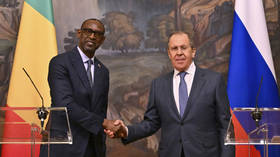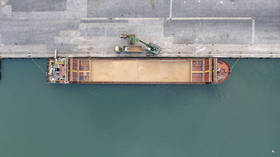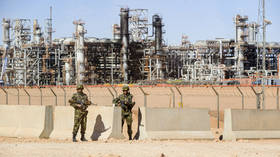Western elites can’t decide if they should sanction or seduce Africa in their attempts to counter Russia and China
In a scramble for influence, the US and its allies are reaching for both the carrot and the stick at the same time

In trying to find ways to effectively counter Russia and China’s partnerships in Africa, Washington – and its Western followers – is not content to just go for the honey or the vinegar – so officials are resorting to both at the same time.
Typically, the Western modus operandi has been to establish a footprint in the target foreign country through military intervention under a security pretext with the hope of eventually pivoting to an economic one. Recent history suggests that elites haven’t quite been able to make the transition before their plans go pear-shaped. Unable to get their hands on the prize – typically, the country’s natural resources – they eventually either get kicked out (as was the case with France in Mali), or end up cutting their losses (like the US did in Afghanistan).
Russia and China have been able to effectively exploit the void created by misguided Western foreign military adventures. In the case of Mali, Russia offered the transitional government military helicopters, radars, and weapons, in addition to “soldiers and trainers” reportedly operating in the African country (according to reports, these are from the Wagner private security company, but officials have distanced themselves from the group). Moscow is now parlaying that foothold into expanded cooperation.
“We paid special attention to the practical aspects of organizing deliveries from Russia of wheat, mineral fertilizers and petroleum products that are so much needed by the people of Mali today in conditions of illegitimate Western sanctions,” Russian Foreign Minister Sergey Lavrov said during a press conference, in May, with his Malian counterpart, Abdoulaye Diop. France and the US sanctioned the country in the wake of delayed elections following two coups, all under the watch of Paris' Operation Barkhane and the EU’s training mission headquartered in the capital, Bamako.
And now Washington is forging ahead with a new tool to threaten African countries that defy its interests. The ‘Countering Malign Russian Activities in Africa Act’ would target African governments, officials, and businesses doing business with Russia, qualified as “manipulation” and “exploitation” of Africans to Russia’s benefit. The plan is in the same spirit as the ‘Countering Russian Influence in Europe and Eurasia Act of 2017’ and the ‘Countering America’s Adversaries Through Sanctions Act’, targeting Iran, Russia, and North Korea… but which also risks threatening India for purchasing a S-400 Russian missile defense system.
The same act was leveraged to halt the construction of the Nord Stream 2 pipeline for the transport of Russian gas into Western Europe under threat of American sanctions – effectively opening up a potential new market for US liquified gas exports.
At the same time, the Western G7 bloc has proposed a $600 billion plan to build foreign infrastructure in Africa and Latin America, with Washington pledging $200 billion and the EU another $300 billion, and private businesses expected to get on board to invest. What are they going to do – sanction some of these countries and then demand that they take Western cash? How awkward.
The idea is to counter China’s Belt and Road project, albeit a decade late and hundreds of billions of dollars short. The message here is clear. These countries can either deal with Russia, China, and other American adversaries and get buried in sanctions, or else they can accept this wonderful opportunity to let Washington and its Western allies into the country to build nice things.
A long-standing US criticism of China is that it exploits its Belt and Road project to ‘debt trap’ countries and impose its influence. But it’s not like Washington’s intent towards underdeveloped countries is purely altruistic.
For an example, look to how the US-funded Marshall Plan for post-WWII Europe helped establish CIA front companies around the continent. Or when Washington funds ‘civil society’ projects in underdeveloped target countries that end up being exposed as operations to subvert the government – one such example being a Twitter-like social media project in Cuba, funded by USAID and uncovered by the Associated Press in 2014.
Speaking at the G7 Summit in Germany, US President Joe Biden said that investment projects include an industrial-scale vaccine manufacturing facility in Senegal, a global subsea telecommunications cable passing through the Horn of Africa, new solar projects in Angola, and a nuclear reactor plant in Romania. But at best, it’s playing catch-up with the $59 billion spent by China last year alone on the 144-country venture.
Only time will tell how much of the announcement is window dressing and marketing – a valid concern given that this is the second year in a row that the proposal has been tabled at the G7 Summit, only to be rebranded and recycled a year later with little else happening in the interim.
“These strategic investments are areas of – critical to sustainable development and to our shared global stability: health and health security, digital connectivity, gender equality and equity, climate and energy security,” Biden said, evoking all the warm and fuzzy buzzwords expected of him. But the true measure of the initiative will be in whether it can successfully replace Washington’s strategy of setting fire to foreign nations for the primary purpose of being able to step in afterwards and offer to help clean up.
The statements, views and opinions expressed in this column are solely those of the author and do not necessarily represent those of RT.
https://www.rt.com/russia/557982-us-push-china-from-africa/




0 Comments:
Post a Comment
Subscribe to Post Comments [Atom]
<< Home